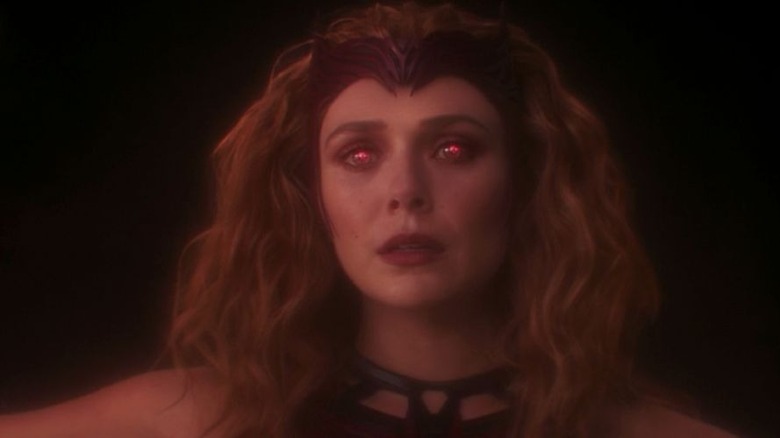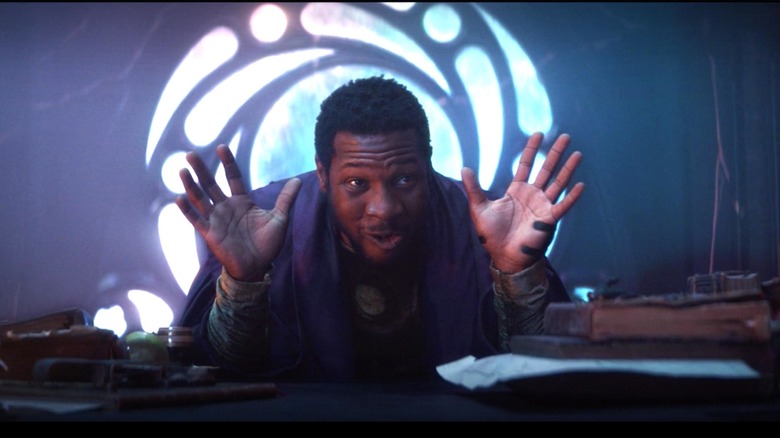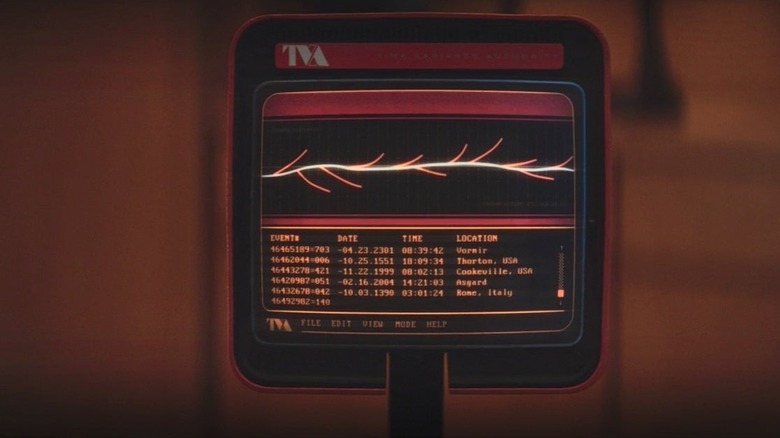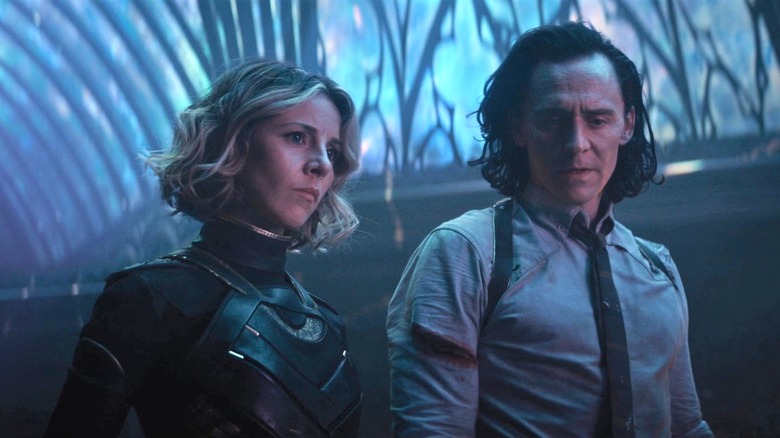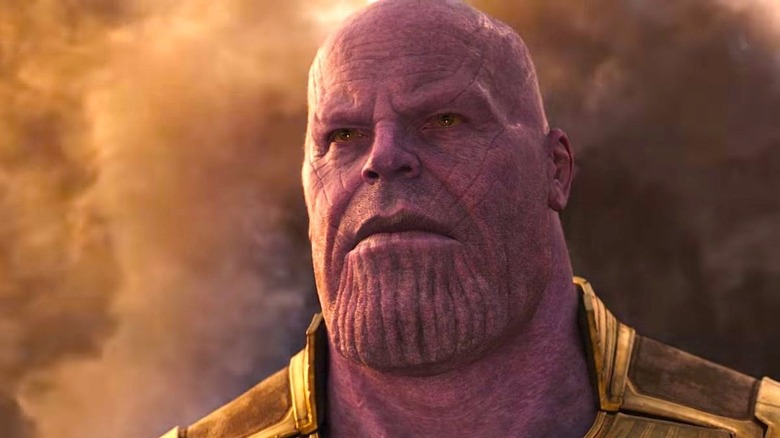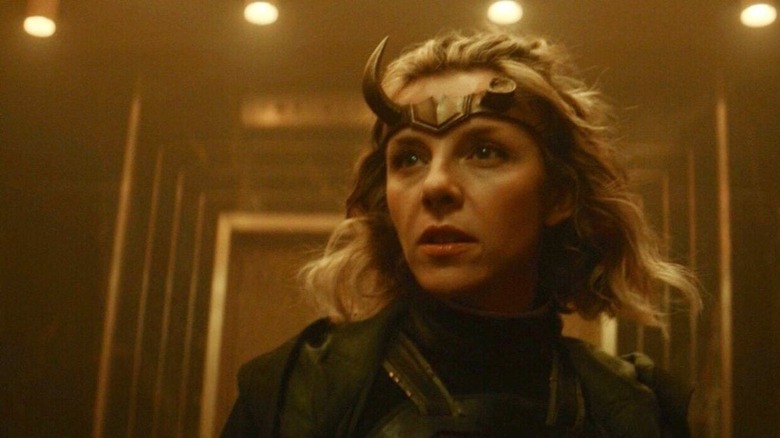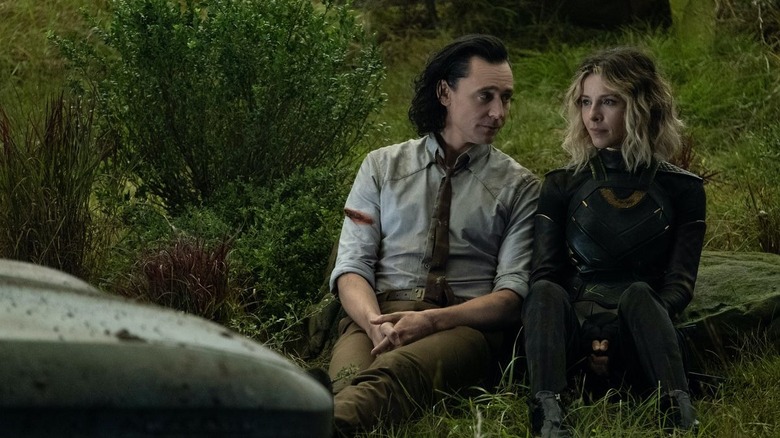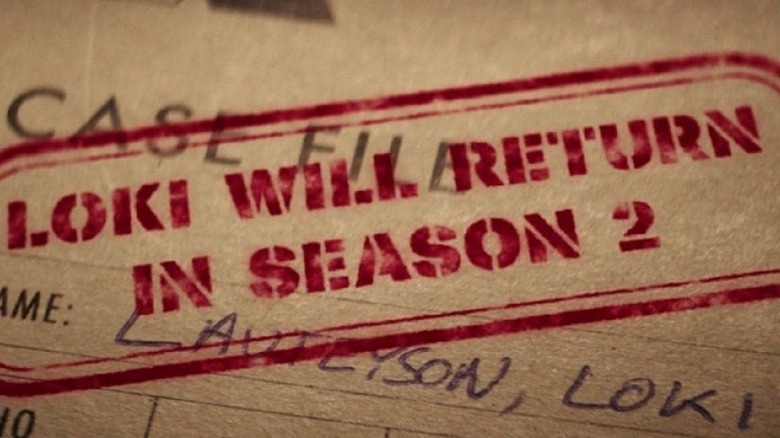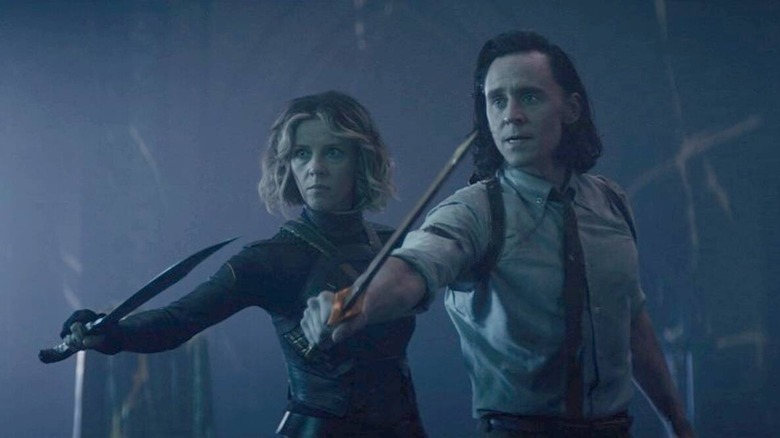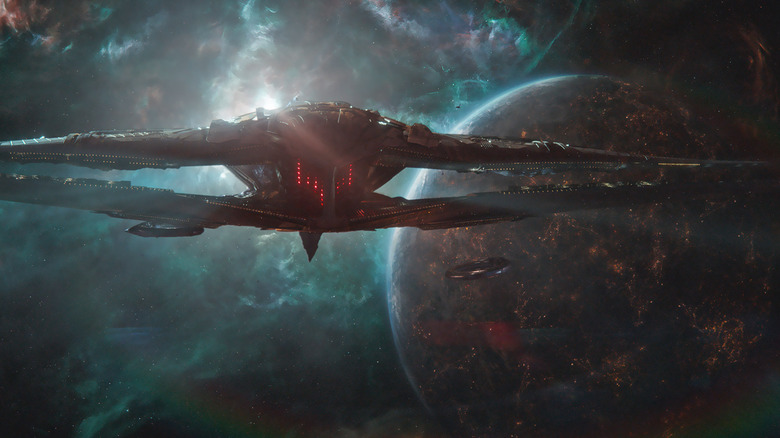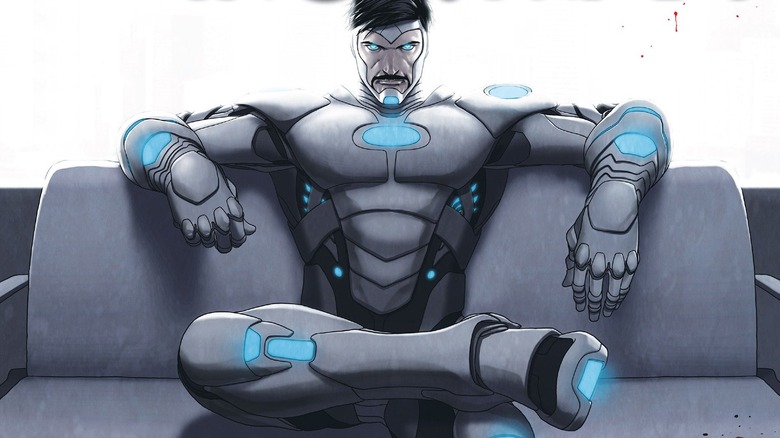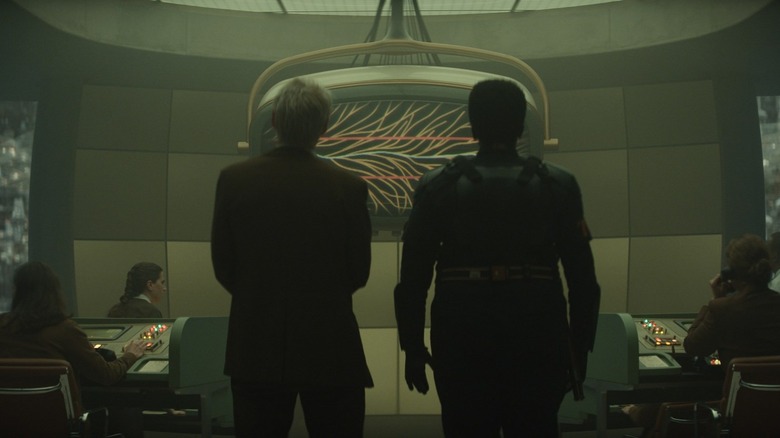What The End Of Loki Means For The MCU's Future
Phase 4 of the Marvel Cinematic Universe has begun with a bang. So far, Marvel has laid the foundation for the MCU's future with their first three Disney+ streaming series. "WandaVision" ends with Wanda Maximoff (Elizabeth Olsen) becoming the Scarlet Witch, while Sam Wilson officially takes on the mantle of Captain America in "The Falcon And The Winter Soldier." Now "Loki" has shaken those foundations by shattering the Sacred Timeline and throwing the multiverse into chaos, opening infinite possibilities for the MCU's future.
Season 1 of "Loki" culminates with the God of Mischief (Tom Hiddleston) and Sylvie (Sophia Di Martino), a Loki variant with powers of enchantment, confronting He Who Remains (Jonathan Majors) at the end of time beyond the Void. The enigmatic creator of the Time Variance Authority tries to convince them to take his place and rule the Sacred Timeline. The consequences if they don't are dire: He Who Remains has evil variants who have already tried to conquer the multiverse. Kill him, and they return.
Which is exactly what happens. Sylvie takes her revenge by killing the man who stole her life. The timeline fractures, and Loki winds up in an alternate timeline at the TVA, now ruled by a mysterious variant of He Who Remains. The seemingly self-contained Disney+ series has irrevocably altered the Marvel Cinematic Universe going forward. Here's how "Loki" sets up the rest of Phase 4 and beyond.
The multiverse madness begins
The Season 1 finale of "Loki" officially kickstarted the next chapter in the MCU: the multiverse saga. The multiverse madness follows the Infinity War saga as Marvel's next big overarching story. Now that the Sacred Timeline has been destroyed, the multiverse has exploded into creation, throwing the doors wide open for all sorts of chaos.
The Ancient One (Tilda Swinton) mentions the multiverse all the way back in 2016's "Doctor Strange," telling the titular character: "This universe is only one of an infinite number. Worlds without end." The witches in 2021's "WandaVision" continue the story: Agatha Harkness (Kathryn Hahn) reveals that Wanda Maximoff is prophesied, in a chapter of the Darkhold, to destroy the multiverse with her chaos magic, moments before Wanda embraces her true power as the Scarlet Witch.
It's possible that the post-credits scene in "WandaVision" could coincide with the Season 1 finale of "Loki." Sylvie kills He Who Remains after reaching the Citadel at the End of Time with Loki. Her actions destroy the Sacred Timeline, causing countless branches to expand across the multiverse. This could be what causes Wanda to hear her twins, Billy and Tommy, suddenly call out to her. Actress Elizabeth Olsen has confirmed that the Scarlet Witch can travel through the multiverse. Wanda will appear alongside the Sorcerer Supreme (Benedict Cumberbatch) in 2022's "Doctor Strange in the Multiverse of Madness," where it's likely fans will see them dealing with the fallout of the Season 1 finale of "Loki."
Is Kang the new Big Bad?
A new saga needs a new Big Bad, and it seems like Kang the Conqueror is stepping into Thanos' shoes. Season 1 of "Loki" concludes with a variant of He Who Remains — likely Kang the Conqueror — as the new ruler of the Time Variance Authority in an alternate timeline created by the fracture of the multiverse. He Who Remains was basically a dictator, erasing realities and pruning variants whenever they didn't fit into his timeline, but he was a benevolent variant. How evil is this new Kang?
Kang's powers surpass the Mad Titan's. Thanos was a force to be reckoned with throughout the galaxy (he beat the Hulk like it was nothing in "Avengers: Infinity War"), but Kang's influence covers the entire multiverse. Powerful villains need powerful heroes. So far, the MCU has established characters like Doctor Strange, the Scarlet Witch and Captain Marvel (Brie Larson) as the most powerful members of the second-generation Avengers. Even with all that power, defeating Kang doesn't seem like an easy feat.
We haven't seen the last of time travel
The MCU's time-traveling adventures are far from over. "Avengers: Endgame" features the first significant use of time travel in the cinematic universe: Thanks to Ant-Man's (Paul Rudd) knowledge of Hank Pym's (Michael Douglas) research and Tony Stark (Robert Downey Jr.) being a genius, the Avengers manage to construct a larger version of the Quantum Tunnel that allows them to travel through time. The team retrieves the Infinity Stones from the past to reverse Thanos' snap. At the Ancient One's behest, the Hulk (Mark Ruffalo) ensures the Stones are returned to their appropriate places in the timeline, with Captain America (Chris Evans) volunteering for the mission so he can finally return to Peggy Carter (Hayley Atwell) in the past.
"Endgame" directly leads into "Loki." The God of Mischief escapes incarceration with the Tesseract, following the Chitauri invasion of New York in 2012, because of the Avengers' time-travel escapade. This creates an alternate timeline that quickly draws the TVA's attention. They capture Loki and prune the timeline, before throwing this new variant of the Trickster into the multiple timeline madness as they hunt for Sylvie.
The TVA stands stronger than ever after the Season 1 finale. Headed by Kang the Conqueror, the bureaucracy can access any point in any timeline thanks to the explosion of the multiverse. To defeat him, the Avengers might also have to utilize the Quantum Tunnel once more for some time-hopping of their own.
Marvel could have its own Earth-2
The Marvel Cinematic Universe forged its legacy (and beat DC to the punch) by forming a multi-film saga full of crossovers, cameos and Easter eggs. It began with "Iron Man" (2008) and truly kicked into gear with 2012's "The Avengers," which saw characters like Iron Man, Captain America and Thor (Chris Hemsworth) come together in a groundbreaking moment for comic book movies. Currently the MCU boasts 24 films as well as three TV shows on Disney+, with many more projects on the horizon.
Now that the multiverse has erupted into infinity, it's possible viewers could see films and shows set in an alternate timeline to the one they know and love. This creates endless opportunities for future Marvel content. Fans could see alternate versions of well-known characters or entirely new characters derived from the comics. In addition, the MCU could introduce R-rated content that exists separately from the main, family-friendly continuity.
DC is doing something similar with their cinematic universe. Matt Reeves' upcoming 2022 film "The Batman," starring Robert Pattinson, is reportedly set in Earth-2 of the DCEU multiverse. It's possible that Todd Philips' "Joker" (2019), with Joaquin Phoenix playing a version of the iconic DC villain, could be set in an alternate DCEU timeline. Marvel could mirror this approach by featuring self-contained stories that still fit into the overarching multiverse.
Thanos could return
Creating new timelines also creates an opportunity for villains like the Mad Titan to return. Thanos used the Quantum Tunnel to travel five years into the future from 2014 to confront the Avengers during "Endgame." Another variant of Thanos, born from the multiverse's eruption in "Loki," could appear again in the main Marvel continuity, or an alternate reality.
Like Kang, Thanos could have variants who are even more evil and tyrannical. Marvel fans could see a dark and dystopian alternate timeline where Thanos rules the galaxy with an iron fist. Or maybe Thanos could return in the least expected way possible: As a hero. The existence of infinite timelines means that, somewhere, somehow, a good variant of Thanos has to exist. With Season 1 of "Loki" exploding the MCU's potential, there is a chance we could see the MCU's OG Big Bad return as a hero. Maybe even an Avenger.
Sylvie's story isn't over
Season 1 of "Loki" introduced MCU fans to Sylvie, another Loki variant with some surprising differences — and similarities — to the God of Mischief. In Episode 4, "The Nexus Event," viewers learn that Sylvie was taken from Asgard as a child by the TVA. The TVA treat young Sylvie the same way they treat Loki in the premiere episode: She is charged with "crimes against the Sacred Timeline" and forced to stand in front of a judge after her reality is pruned.
Sylvie escapes from the TVA by stealing Ravonna Renslayer's (Gugu Mbatha-Raw) TemPad, and spends most of her life hiding from the TVA in apocalyptic events throughout the timeline. Throughout her life, Sylvie is motivated to do one thing: Destroy the TVA. Sylvie gets her vengeance when she kills He Who Remains, but her actions only lead to more upset. The TVA is still going strong, headed by a new, more villainous Kang variant.
Fans haven't seen the last of Sylvie. The enchanting Goddess of Mischief develops a relationship with Loki throughout Season 2, and the two variants share a kiss in the season finale. Sylvie and Loki may be apart for now — Sylvie's still at the Citadel at the End of Time, and Loki in an alternate TVA — but it seems a matter of time before they reunite for more time-traveling adventures.
Loki is a good guy now
Who would have guessed that Loki, God of Mischief and antagonist in "The Avengers," would become one of the MCU's most lovable anti-heroes? "Loki" takes the titular character on a journey of emotional development. Mobius (Owen Wilson) forces Loki to reflect on his life thus far, indicating the darkest moments in the adopted Asgardian's history. Remember when Loki smiled while gouging a man's eye in "The Avengers?" Mobius remembers. He's not afraid to confront Loki with some harsh truths either. He makes Loki relive his worst deeds including the eyeball incident, remarking: "Yeah. I don't see anything very mischievous about this."
The Disney+ series takes Loki on a drastic journey in six episodes. Mobius forces him to examine his morality and motivation. Meeting Sylvie is what truly changes the God of Mischief, however. Admittedly, Loki is a bit of a narcissist. He's drawn to another version of himself, something Mobius picks up on. But Loki's feelings for Sylvie are more than that. He understands her loneliness and connects with her better than he ever did with Thor. Loki is more empathetic thanks to Sylvie and Mobius, and wants to create a better legacy for himself that doesn't end at Thanos' hands.
Disney+ shows can have multiple seasons
Before "Loki," the Disney+ shows appeared to be limited series set in between Marvel movies. "WandaVision" was submitted to the Emmys as a limited series, and Elizabeth Olsen has stated that the show won't have a second season, although she added, "With Marvel, you can never [really] say no." Instead, Wanda will feature in the upcoming "Doctor Strange" sequel, hitting theatres in March 2022. "The Falcon And The Winter Soldier" sets up a fourth "Captain America" film, with Sam Wilson (Anthony Mackie) now wielding the shield.
The post-credits scene for "Loki" confirms that there will be a Season 2 for the Marvel sci-fi series. Other Disney+ projects such as "Hawkeye" (2021) "Ms. Marvel" (2021) and "She-Hulk" (2022) might follow suit with this approach. Multiple seasons of Disney+ series, as well as the MCU's usual slate of movies, means that Marvel fans have more content to look forward to than ever — and it's all starting with "Loki."
Loki and Sylvie could still rule the multiverse
He Who Remains tempts Loki and Sylvie with an enticing offer in the Season 1 finale: spare his life and become the new leaders of the TVA. The offer fails to sway Sylvie, but Loki recognizes that accepting might be the only way to prevent an evil variant of Kang emerging to kick off another multiversal war. In the end, Sylvie rejects the opportunity to rule the TVA and kills He Who Remains, throwing the multiverse into chaos.
Loki and Sylvie could still become the new leaders of the TVA in a future season of "Loki." If they successfully oust Kang in Season 1, the TVA could come under their control, fulfilling Loki's previous desire for power. Kang looks like a formidable enemy, one who won't go down without a fight. But anything can happen in the MCU — if Loki and Sylvie discover Kang's weakness, they might be able to overthrow the conqueror and establish themselves as the TVA's new leaders.
Assuming leadership of the TVA would arguably make Loki and Sylvie the most powerful figures in the MCU. Overseeing the flow of time surpasses the powers of Avengers like Iron Man, Captain America and even Thor. Loki would get his wish from "The Avengers" — sort of — becoming even more powerful than Earth's Mightiest Heroes.
The MCU is getting weirder
In the beginning, the MCU was pretty tame. Tony Stark's power was his wealth and technology, Steve Rogers was physically enhanced by science, and the villains they faced (Whiplash, the Red Skull, Obadiah Stane) were regular humans juiced up with armor and super-serum. The weirdest part of Phase 1 was Thor, a literal Norse god from another world, as well as Loki himself.
Then the MCU expanded. More and more otherworldly and sci-fi elements made their way onto the big screen: "Doctor Strange" brought magic to the MCU, while the cosmos and its characters were explored in James Gunn's "Guardians Of The Galaxy." Over time, fans have seen all manner of weirdness in the MCU, such as evil sorcerers, extra-dimensional entities, alien overlords and celestial beings.
Yet Marvel's "out-there" storytelling has barely begun. "Loki" paves the way for the multiverse saga and introduces fans to all sorts of cool sci-fi elements like alternate realities, branching timelines and parallel dimensions. The MCU's potential is limitless. One thing is clear; it's only going to get weirder.
More variants of the Avengers
Phase 4 may be crafting a few Avengers-like teams to follow Earth's Mightiest Heroes. Valentina Allegra de Fontaine, aka the Contessa, (Julia Louis-Dreyfus) recruits John Walker/U.S Agent in "The Falcon And The Winter Soldier" and Yelena Belova in "Black Widow" for a mysterious team many fans suspect will be a variation of the Thunderbolts. New characters like Billy and Tommy Maximoff from "WandaVision" and Kate Bishop from "Hawkeye" sow the seeds for a Young Avengers project. What about a Dark Avengers team too?
Evil variants of the Avengers could exist in alternate timelines. Think Superman in the "Injustice" video game and comic book series: Joker tricks the Man of Steel into murdering a pregnant Lois Lane. This triggers a descent into tyranny for Superman and various DC characters, notably Wonder Woman. The Knightmare sequence in Zack Snyder's "Justice League" references the "Injustice" saga, with Batman (Ben Affleck) and a band of survivors (including Jared Leto's Joker) facing off against an evil Superman.
Something similar could happen in a different branch of the Marvel multiverse. The death of Pepper Potts or Peter Parker could have triggered a similar dark new path for Tony Stark (an evil version of Tony called Superior Iron Man exists in the comics). Captain America could have been brainwashed by Hydra like his best friend Bucky Barnes/The Winter Soldier. Either of these dark variants of beloved Marvel heroes could find their way to the main timeline in the MCU's future.
It's chaos from here on out
It looks like He Who Remains was right: Sylvie killing him caused the Sacred Timeline to splinter into infinite branches, throwing the multiverse into chaos and promising a crazy journey ahead for many Marvel characters. Anything is possible now. Loki, Sylvie and Mobius have their work cut out for them in Season 2 of "Loki," and that's only if Loki can convince Mobius of the truth to begin with. He did it once in Season 1. Can lightning strike twice for the God of Mischief?
Fans are likely to see the effects of the Season 1 finale of "Loki" rippling throughout the MCU now. 2021's "Spider-Man: No Way Home" and "Doctor Strange in the Multiverse of Madness" will chronicle the next chapter of the timeline debacle. Little is certain about the MCU's future, but it's bound to be chaotic. Marvel fans are in for a wild ride.

